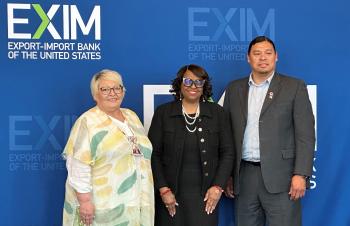Image Caption
Summary
Local Journalism Initiative Reporter
Windspeaker.com
Representatives from the Saskatchewan First Nations Natural Resource Centre of Excellence were in Washington, DC last week to assert the sovereignty of First Nations as economic partners with the United States.
It was an important three-day trip, says centre board chair Heather Bear, vice-chief with the Federation of Sovereign Indigenous Nations (FSIN). That’s because the governments of Canada and the United States have signaled their intent to accelerate green energy transition and encourage domestic manufacturing. This will improve North American energy security by reducing dependence on the foreign supply of minerals from countries such as China and Russia.
The meetings were a month in the making, says Bear.
They were set up to address the Biden administration's invocation of the Defense Production Act Title III Program. It has the potential to designate Saskatchewan critical mineral projects for U.S. Department of Defense funding, said the centre in a statement.
More generally, Title III, signed in March 2022, allows U.S. authorities to strengthen the country’s industrial base for large-capacity batteries. This action authorizes the U.S. Department of Defense to increase domestic mining and processing of critical materials for the large-capacity battery supply chain.
“When we look at Canada and the United States, we look at (Canada) as more domestic,” said Bear, which results in “regulatory uncertainty.”
“The best way to address those uncertainties is to ensure that partnerships are in place with sovereign First Nations before projects advance to permitting,” she said.
Bear and centre president/CEO Sheldon Wuttunee led the 13-member delegation, which consisted of chiefs and business leaders from throughout the province, in “very high-level discussions” June 5 to June 7.
Meetings held included the White House, the Pentagon, departments of Energy, Commerce, and Interior, and senate committees on Energy and Resources, Indian Affairs and Appropriations.
Bear says the delegation highlighted the necessity of involving First Nations in the development of the North American green economy, including critical minerals, value chains and the deployment of small modular nuclear reactors.
Small modular reactors require uranium and the world’s largest high-grade uranium deposits are located in northern Saskatchewan.
Bear says the delegation also voiced concerns around free, prior and informed consent, and accommodation, and the fact that First Nations have not been involved in plans by governments of either country.
“But we don't have to be included in that plan to assert our sovereign powers, our right to do business nation-to-nation,” said Bear.
She adds that they stressed that First Nations and Indigenous businesses were looking at more than simply providing jobs as the green energy economy ramped up. They wanted to “occupy the field” with equity partnerships and ownership for responsible resource development.
To that end, says Bear, they had a “wonderful meeting” with board chair Reta Jo Lewis of the Export-Import Bank of the US (EXIM), who committed “as little or as much” loan support as needed.
“(Loans have) been one of our biggest challenges as First Nations. I see those walls and those barriers coming down. The interest and the desire to do business on First Nations land is exciting,” said Bear.
She adds that Canada has also got to step up when it comes to loan guarantees and be a “little more flexible with our lending criteria.”
Bear says that even if First Nations choose not to have an equity stake in resource projects, they still must be informed and included before projects are announced.
Bear calls the meetings in the United States productive.
“I think it was a first step to the development of those relationships with key staff in the United States, within the United States government, and also for the not-for-profit sector to support policy development that would lead to greater participation of our sovereign nations in resource development across North America,” she said.
The delegates also met with the non-profit organizations National Center for American Indian Enterprise Development and Securing America's Future Energy.
“This is a new chapter that hasn’t been written yet.”
The Saskatchewan First Nations Natural Resource Centre of Excellence was founded in 2009 by the FSIN Lands and Resources Commission.
Wholly owned by the 74 First Nations in Saskatchewan, it has a mandate to support their participation in the innovative, sustainable, and environmentally responsible management/development of natural resources within Treaty lands and traditional territories.
The 12-member board of directors is comprised of elected leadership representing each of the 10 provincial tribal councils, independent Nations in the province, and the FSIN.
Never miss a Windspeaker article. Subscribe Today to our new Windspeaker Newsletter!
Local Journalism Initiative Reporters are supported by a financial contribution made by the Government of Canada.

